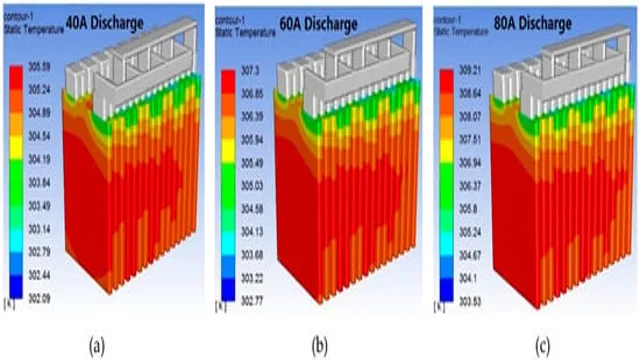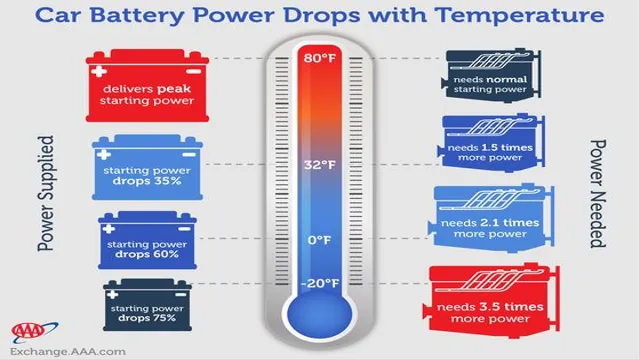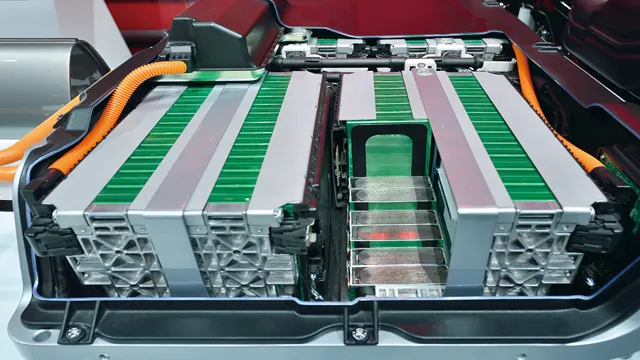The Critical Connection Between Electric Car Battery Lifespan and Operating Temperature: Explained!
Electric cars are becoming increasingly popular these days, with more and more people opting for environmentally-friendly vehicles. However, one of the major concerns that arise with these vehicles is their battery operating temperature. The temperature of an electric car battery plays a crucial role in determining its performance and efficiency, and hence it becomes important to understand its workings.
Like any other battery, electric car batteries too have optimal temperature ranges within which they function at their best. Batteries that operate at high temperatures tend to degrade faster, thereby reducing their lifespan and efficiency. On the other hand, batteries that operate in very low temperatures may face difficulty in charging or discharging, leading to reduced performance.
So, what is the ideal temperature range for electric car batteries? How can we ensure that the battery functions optimally and lasts longer? These are some of the questions that plague the minds of electric car owners. In this blog, we will dive deep into the world of electric car batteries and explore the various factors that affect their operating temperature. From the impact of ambient temperature on battery performance to the role of thermal management systems, we will cover it all.
As we learn about the workings of electric car batteries, we will also discuss some tips and tricks to maintain the battery temperature at an optimal range. So, buckle up and get ready to explore the fascinating world of electric car batteries and their operating temperatures.
What is the ideal operating temperature for electric car batteries?
When it comes to electric car batteries, the ideal operating temperature can vary depending on the specific model and manufacturer. However, in general, the optimal temperature range for electric car batteries falls between 20 and 30 degrees Celsius. This temperature range ensures that the battery is able to operate efficiently without risk of overheating or freezing up.
While temperatures outside of this range won’t necessarily damage the battery, they can have a negative impact on its overall performance and longevity. For example, high temperatures can cause the battery to degrade more quickly, while extremely low temperatures can cause it to temporarily lose some of its capacity. It’s worth noting that many electric vehicles come equipped with a battery management system that helps regulate the temperature and keep it within the optimal range.
So, if you’re in the market for an electric car, be sure to check if the model you’re interested in has this feature.
Exploring the impact of temperature on EV battery performance
Electric car batteries are sensitive to temperature, and it’s crucial to maintain them within a certain range for optimal performance and longevity. The ideal operating temperature for EV batteries is between 20°C and 25°C. However, extreme hot or cold temperatures can impact the battery’s ability to hold and discharge power effectively, reducing efficiency and range.
High temperatures can cause the battery to degrade faster, reducing its lifespan and performance, while low temperatures can increase internal resistance and reduce the battery’s ability to provide enough power for acceleration or regenerative braking. To keep your electric car performing at its best, it’s essential to monitor your battery’s temperature and avoid exposing it to extreme temperatures for prolonged periods. Consider parking your EV in a garage or shaded area during hot weather, and use a battery blanket to keep it warm in cold weather.
By paying attention to your battery’s temperature and taking necessary precautions, you can ensure your electric car delivers reliable and efficient performance over the long term.

Comparing optimal temperature range for different EV models
The optimal operating temperature for electric car batteries can vary based on the make and model. For example, the Tesla Model S and X have optimal battery temperatures between 70-80°F, whereas the Nissan Leaf operates best between 60-80°F. It’s important to note that extreme temperatures can have a drastic effect on battery performance and lifespan.
High temperatures can cause the battery to degrade faster, while low temperatures can reduce its range and overall performance. That’s why it’s important to keep your electric car parked in a garage or shaded area during hot weather and to utilize the vehicle’s climate control system to keep the battery at a comfortable temperature. Similarly, during cold weather, preheating your car before driving can help optimize its performance.
Ultimately, maintaining an optimal battery temperature can extend the lifespan and improve the performance of your electric vehicle.
Effects of temperature outside the optimal range
When it comes to electric car batteries, the operating temperature plays a crucial role in their performance and longevity. If the temperature is outside the optimal range, the battery can experience negative effects. For example, if the temperature is too high, the battery can degrade faster, resulting in reduced range and overall lifespan.
On the other hand, if the temperature is too low, the battery performance can decrease, and the range can also be limited. It’s essential to keep the battery within the optimal operating temperature range to maximize its potential and avoid any unnecessary degradation. Some electric cars come equipped with a battery cooling and heating system to help control the battery’s temperature, ensuring the best possible performance and lifespan for the battery.
Taking good care of your electric car battery is essential for its longevity, maintaining its range, and ensuring a smooth driving experience.
How extreme heat and cold can affect electric car batteries
Electric car batteries are highly sensitive to temperature changes, especially when outside the optimal range. Extreme heat and cold can have serious effects on battery performance, leading to reduced range and battery life. When exposed to high temperatures, the battery may lose its ability to hold a charge, which can significantly reduce the electric car’s driving range.
On the other hand, extreme cold can also affect battery performance by slowing down chemical reactions and reducing the power output. This means that electric cars may not be able to accelerate or maintain high speeds when the temperature is below freezing. Therefore, it is essential to consider climate conditions when choosing an electric car and to take measures to protect the battery from extreme temperatures, such as parking in a shaded area or using a battery thermal management system.
Regular maintenance and monitoring of battery health can also help to extend the battery life and optimize its performance.
Case studies of electric car battery failure due to temperature-related issues
When it comes to electric car batteries, temperature plays a crucial role. It’s been noted that the effects of temperature outside the optimal range can lead to battery failure. In fact, there have been cases where batteries have completely shut down due to extreme heat or cold.
For example, an owner of a Chevy Bolt reported battery failure after leaving the car parked in an airport parking lot during extreme winter temperatures. Similarly, a Nissan Leaf owner experienced battery degradation after consistently parking their car in direct sunlight during the summer months. These cases serve as a reminder that taking care of the battery’s temperature is just as important as taking care of the battery’s charge.
It’s crucial for EV owners to understand the optimal temperature range for their battery and take necessary precautions to prevent temperature-related battery issues.
Tips for protecting the EV battery from extreme temperatures
When it comes to electric vehicles, the battery is one of the most critical components. Extreme temperatures can have a significant impact on the battery, reducing its efficiency and shortening its lifespan. High temperatures can cause the battery to degrade more rapidly, while cold temperatures can reduce the battery’s ability to provide power.
It’s important to protect your EV battery from extreme temperatures to ensure it performs optimally. Some tips for doing so include keeping the battery charged to around 50%, parking the car in a shaded area during hot weather, and using insulation or a battery warmer during cold weather. By protecting your EV battery from extreme temperatures, you can extend its lifespan and ensure your vehicle performs at its best.
Innovations in EV battery temperature management
Electric car battery operating temperature is a critical factor when it comes to the performance and lifespan of EV batteries. Overheating can lead to a reduction in battery capacity and life, and even cause safety hazards. Thus, innovations in battery temperature management have become increasingly crucial in the development of EV technology.
One such innovation is the use of advanced thermal management systems that can regulate the battery temperature through active cooling or heating. This system ensures that the battery operates within a safe temperature range, which maximizes its lifespan and performance. Another innovation is the use of phase change materials (PCM) that absorb the excess heat generated by the battery.
PCM acts like a buffer, preventing the battery from overheating, and improving its efficiency. These innovations in battery temperature management have reduced the likelihood of battery failure and enhanced EV range, making EVs more appealing to consumers.
Heat-resistant battery cell materials
As electric vehicles (EVs) become more prevalent, innovators continue to find ways to improve the technology behind them. One area of focus is temperature management in EV batteries, which is essential for battery performance and longevity. Heat-resistant battery cell materials can drastically improve battery lifespan by reducing the risk of thermal runaway, which can cause serious safety issues.
Materials such as silicon carbide (SiC), which has a high thermal conductivity and can withstand high temperatures, are being researched for use in EV batteries. By incorporating heat-resistant materials into batteries, manufacturers can design EVs that operate in extreme temperatures while still maintaining optimal energy efficiency. As a result, cars with such technology, the performance and reliability of an EV is expected improve, attracting even more car buyers to the electric market.
Liquid cooling and heating systems for electric car batteries
Electric vehicles are becoming more and more popular, and with that comes the need for efficient battery temperature management. One innovation that has emerged is the use of liquid cooling and heating systems. These systems work by circulating a liquid through the battery pack, which helps regulate the temperature and keep it within the optimal range.
When the battery is charging, the liquid is cooled, and when it’s discharging, the liquid is heated. This helps prevent overheating or overcooling, which can damage the battery and reduce its lifespan. This technology is still relatively new, but it shows a lot of promise for improving the performance and longevity of electric car batteries.
With the growing demand for EVs, it’s likely that we’ll see even more advancements in battery temperature management in the near future.
Conclusion: The importance of understanding electric car battery operating temperature
In the world of electric cars, the battery operating temperature is the hot topic of the moment. It’s not just about keeping the battery cool, but also ensuring it stays within optimal temperature range even in cold weather. From chill charging to active thermal management, automakers are pushing the limits to ensure electric cars can beat the heat and stay charged for longer.
So, charge up and hit the open road, because with these advancements, the future of electric cars is looking hotter than ever.”
FAQs
What is the optimal temperature range for an electric car battery to operate within?
Electric car batteries operate best within an optimal temperature range of 20-30°C (68-86°F).
What happens if an electric car battery operates outside of the optimal temperature range?
Operating an electric car battery outside of the optimal temperature range can lead to reduced battery performance, decreased range, and potential battery damage.
Can extreme cold temperatures affect the range of an electric car?
Yes, cold temperatures below 0°C (32°F) can significantly reduce the range of an electric car, as the battery has to work harder in the cold to keep up with demands.
How can you optimize the temperature of an electric car battery in different weather conditions?
You can optimize the temperature of an electric car battery by using climate control features to preheat or cool the battery before driving, parking the car in a garage or covered area during extreme weather, and avoiding frequent fast charging in high temperatures.





